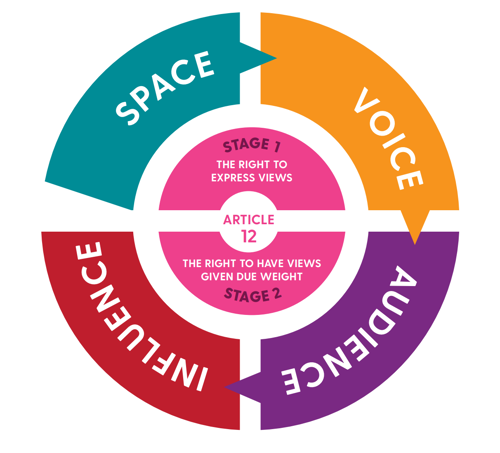Recognising and realising children's rights
United Nations Convention on the Rights of the Child (Incorporation) (Scotland) Act 2024 incorporates the UNCRC into Scots law.
“Human rights become the starting point for the delivery of public services and how we guarantee children are treated with dignity, respect and kept safe from harm” (Together Scotland)
The Children's Rights Skills and Knowledge Framework can help you to reflect on children’s rights and take a children’s human rights approach to your practice.
Respecting rights in practice
The act supports us to:
- connect our work to the real lives of children and young people (Article 3)
- consider how our work affects children and young people and be willing to adapt based on their feedback (Articles 3, 12)
- visit schools and other settings in environmentally friendly ways, balancing the ease of digital connections with the importance of face-to-face interactions (Article 24)
- encourage people to discuss their learning and its impact in safe, supportive environments where everyone can speak and be heard (Articles 2, 12, 13, 29)
- commit to engaging with all learners, listening to their ideas and opinions to improve our own learning and actions (Articles 12, 29)
- identify which learners we might not be hearing from enough and take steps to address this
- respect people's time for relaxation and play, avoiding changes to breaktimes and lunchtimes unless everyone agrees (Article 31).
- support the right for children, young people, and adults to take breaks (Article 31)
Why children's rights matter
In this video about the United Nations Convention on the Rights of the Child (UNCRC) features members of Children's Parliament. They discuss the need for UNCRC incorporation and the impact of making rights real for children in Scotland today.
The time is now (video)
Creating accessible resources
When creating and sharing resources:
- always make sure that they are written in child-friendly language
- consider if they should also be produced in Gaelic, British Sign Language or other community languages
- expand acronyms, including UNCRC, on slides and when speaking so everyone can understand what they stand for
Read more tips for creating child friendly information (PDF cypcs.org.uk)
How to respect everyone's rights
We can facilitate and communicate rights through:
- including a regular section on human rights (including the UNCRC) in meetings
- asking for any special requirements participants or visitors have
- ensuring venues are fully accessible
- providing a way for participants to give feedback on how inclusive the session was
- making every effort to enable participants to use their language of choice
- treating people as individuals and avoid making assumptions or projecting cultural stereotypes
- linking the UNCRC articles to any professional learning delivered
- helping every child and young person reach their potential
- giving children and young people meaningful opportunities to participate in decision making
Supporting meaningful participation
Children and young people must have a safe, inclusive space to form ideas, express their views and participate. Visit learner participation in educational settings for more information and resources to support meaningful participation.
The Lundy Model of Participation provides a framework for understanding Article 12 of the UNCRC. It focuses on four related elements. The four elements have a rational chronological order:
- space
- voice
- audience
- influence
Stage one: "children and young people need to feel that they can express their views".
Stage two: "these views need to be heard and acted upon as appropriate".

Read more about children's rights in Scotland.
